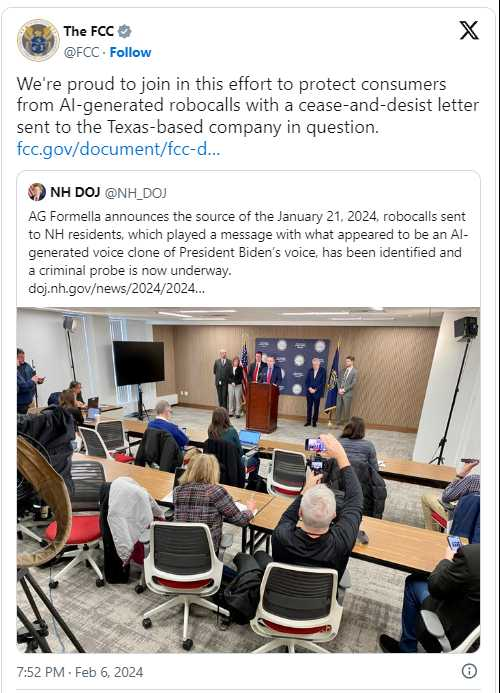The current state of affairs has led us to a troubling realization: we can no longer take for granted the authenticity of what we hear or see. 🤔 With the rise of deepfakes and advanced manipulation technologies, discerning reality from fiction has become increasingly challenging. 💻🔍 It's crucial to approach information with a critical eye and employ skepticism in navigating today's digital landscape. 📰- D
In an announcement from the New Hampshire Department of Justice, Attorney General John Formella stated that the AG’s Office Election Law Unit identified the source as a Texas-based firm, Life Corporation and an individual named Walter Monk.
The automated messages were generated by an artificial intelligence (AI) deepfake tool to meddle in the 2024 presidential election. The state attorney general’s office labeled the robocalls as misinformation, advising New Hampshire voters to ignore the message.
AI deepfake tools refer to software or applications that use advanced AI algorithms to create highly realistic and deceptive digital content, such as videos, audio recordings or images.
The state attorney general identified voter suppression calls in New Hampshire in mid-January, and the investigation was initiated in collaboration with state and federal partners like the Anti-Robocall Multistate Litigation Task Force and the Federal Communications Commission Enforcement Bureau.
The state attorney general identified voter suppression calls in New Hampshire in mid-January, and the investigation was initiated in collaboration with state and federal partners like the Anti-Robocall Multistate Litigation Task Force and the Federal Communications Commission Enforcement Bureau.
Election Law Unit investigators traced the calls to a Texas-based telecoms provider, Lingo Telecom. Meanwhile, the U.S. Federal Communications Commission also issued a cease-and-desist letter to Lingo Telecom for alleged AI-generated voice cloning in robocalls. The letter orders an immediate halt to supporting illegal robocall traffic.
On Jan. 31, FCC Chairwoman Jessica Rosenworcel proposed considering calls featuring AI-generated voices as illegal, subject to the regulations and penalties outlined in the Telephone Consumer Protection Act.
Deepfakes have deepened concerns about AI-generated content, with the World Economic Forum highlighting the adverse outcomes of AI technologies in its 19th Global Risks Report. The Canadian Security Intelligence Service — Canada’s primary national intelligence agency — has also raised concerns about the disinformation campaigns conducted across the internet using AI deepfakes.














 All while Pfizer—a company with a $2.3 billion criminal fine for fraudulent marketing, bribery, and kickbacks—was given blanket immunity from liability and billions in taxpayer dollars to produce a vaccine in record time with no long-term safety data.
All while Pfizer—a company with a $2.3 billion criminal fine for fraudulent marketing, bribery, and kickbacks—was given blanket immunity from liability and billions in taxpayer dollars to produce a vaccine in record time with no long-term safety data.
























